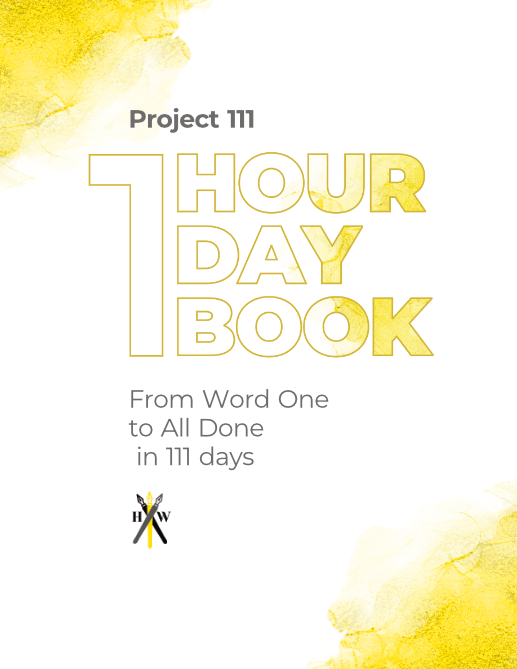Most writing advice takes the form of advancing your ability to craft and formulate an engaging story. But so often the advice ceases to explore storytelling beyond story construction. Imagine stories are like buildings and authors are like every facet of the building’s lifetime.
Authors represent the architects who plan out the building and the construction workers who place the blocks. The readers later represent the people who inhabit the building.
We so often receive advice on how to outfit a story with support beams, scaffolding, and room layouts. All those suggestions and tips provide enough information for us to conjure up a story that can fit the definition of a story, but in focusing so much on the building’s construction, writing advice often leaves out one of the most crucial elements: beautifying and furnishing with vivid verbs.
We (including us here at Habit Writing) focus so intensely on how to construct a story that we forget to learn (or teach) how to write beautifully.
Certainly you can find plenty of books on writing poetry that place special emphasis on imagery, vivid verbs, provocative adjectives, and plenty of other ways to string together words to achieve meaning and beauty. But this aspect of writing is noticeably absent (or severely underrepresented) in books on writing fiction.
In this article, we’ll discuss some ways to include the right verb and bolster your vocabulary.
Table of Contents
Verbs
The Merriam-Webster dictionary has a 67-word definition of what a verb is and entails, but we’ll stick with the simplest one: a verb is an action word.
Elementary teachers grill their students on verbs, students of a new language memorize verbs, and every day everyone everywhere participates in verbs. I doubt anyone could overstate the importance of verbs as a whole.
To Be Verbs

And yet, we focus so little on them because they can slide under the radar. Our interest in these sentence building blocks fizzles out because so many easier options exist. Think about how often you use a “to be” verb and connect it to some sort of description. Try this one: “Taxes are boring.”
I certainly agree with this sentiment, but “are” here plays the role of a weak verb. Sure they “are boring” (unless you work as a tax attorney and find them deeply engaging), but we can easily replace the “to be” verb with a more precise one. “Taxes bore me.” This sentence employs a strong verb that efficiently describes what exactly taxes do.
Ridding your manuscript of as many “to be” verbs as you can will drastically upgrade your writing. Sometimes you can’t escape “to be” verbs because things exist, things are. But, by removing them as often as possible and replacing them with a better word choice, you can color your language, more accurately depict your characters’ actions, and subtly increase your readers’ enjoyment.
If you find yourself writing a “to be” verb, you should first ask yourself, “Is this necessary?” If it is, by all means include it. If you find, on the other hand, that you can rewrite the same idea without one, you’ll likely notice that the sentence promotes a stronger, more effective visual. At the very least, you might just think more creatively about your writing.
As another exercise, we’ll pretend you were about to write the phrase, “James was tired.”
This phrase seems quite bland (but serviceable). Think of how you might show that James is tired without using a “to be” verb. We’ll put this picture of a tired person here so you don’t skip ahead to what we’ve thought up.

For the sake of hyperbolizing my point, I wrote this: James’s every thought begged him to slither into bed where he might finally alleviate the protuberant bags under his eyes.
Getting rid of “to be” verbs needn’t be this loquacious, but hopefully you can see that when confronting this type of verb, you can choose the lazy route or the descriptive route.
Choosing vivid verbs and descriptions can prove immensely difficult, but the more you practice it, the simpler it becomes. If you don’t want to spend your writing time stopping every three minutes to invoke the story gods for a better verb, simply highlight the “to be” instance and return to it later.
Spice Up the Common Verb

Another way you can introduce vivid verbs into your writing comes when you replace a common verb with a more exciting one. The replacement doesn’t always need excite your readers, but it does present you with characterization moments.
Let’s take the simple and common verb “walk”. This verb does what we need it to, but if your character has a broken or peg leg, their walk may appear drastically different from another’s. Maybe rather than walking, the character limps away, hobbles away, or step-drags step-drags away.
By playing around with new ways of describing common words, you facilitate characterization and make your characters more life-like and unique.
Beyond just including more interesting verbs, this form of characterization can introduce motifs to your characters. A certain character might always slurp their wine instead of simply drinking it. Maybe your Captain of the Guard struts instead of marches. If you use a vivid verb in the place of a normal one and constantly associate it with a character, the reader will form an attachment to that word and character.
Every word you use when depicting your character will bring life to them and set them apart (if you use a descriptive verb).
A note on adverbs: Stephen King, that great detester of adverbs is quoted to say, “I believe the road to hell is paved with adverbs, and I will shout it from the rooftops. To put it another way, they’re like dandelions. If you have one in your lawn, it looks pretty and unique.” He furthers this simile by saying that the adverbs become weeds in a once beautiful lawn.
Now, Stephen King’s success as one of the greats means we should at least validate his advice, but it doesn’t mean we have to follow it to a T. The problem with adverbs is they’re easy.
Rather than replacing common verbs with better verbs, we can simply take the verb and attach an adverb to it. Rather than “He hobbled away”, we can say “He walked unsteadily.”
There’s nothing inherently wrong with adverbs; in fact, they can describe activities in ways that some verbs simply cannot. Yet, if you constantly use adverbs when a stronger verb can do the same thing, you’ll likely exasperate your readers (especially if they’re writers who have heard Stephen King’s vitriolic detestation of adverbs).
Strengthening Your Vocabulary

Improving and expanding your vocabulary takes years of dedication and habitual research. That is, of course, unless you want to sit down and perform rote memorization of words like you’re learning a new language. We don’t suggest doing that.
The key to bolstering your vocabulary is quite simple: Read. A lot. (Which will also help with finding story ideas.)
Because most people cycle through the same colloquial words, you can’t effectively rely on learning new words through conversation.
Reading, then, presents us with the best way to encounter brand new words, and in this case, verbs. While reading, pay attention to words you don’t immediately recognize, then, when you find one, search your trusty (and nearby) dictionary to read through the definition.
But don’t just read through it once. Read it over again to help solidify your understanding.
Then, make note of the word somehow. I keep a running list of new words on my phone and try to read through it and test myself whenever I remember to.
The final step is to use the new words you learn. You can say them in conversation or write them in a story or essay. But once you’ve used a new piece of your vocabulary arsenal, you’ll more easily remember it.
Reading a word and learning its meaning is like watching the trailer to a movie. You have a brief idea of what the movie contains, but seeing the movie will help you remember and experience it.
Using the word is like watching the movie. You know its shape. The more you watch it, the more familiar it feels. Do that with words and each one will become a powerful tool in your writer’s hands.
Aside from reading, you can strengthen your vocab with a thesaurus. This method presents some dangers, however. I personally have succumbed to a flashy new thesaurus verb only to find out that it means something different than I thought.
Never use a thesaurus without a dictionary. Think of it as a certification process. You can be sure it’ll fit your sentence when you know what it means. Then, once certified, it’ll also stick in your memory better.
Finally, love words! This may be an unteachable practice, but I imagine that as a writer you already have an innate appreciation of language. Follow that passion and chase down the origin of words. Learn derivatives and etymology.
Generations of people constructed language and words follow rules. Learn the rules and the way they connect. The more you love a language, the more you’ll absorb new words and ways of finding them.

Our 84-page book planner and 111 day writing course.
Conclusion

Writing takes practice. If this article felt overwhelming, just remember that you can improve one word at a time, but you don’t have to get stuck on switching over every single verb.
Don’t get caught up thinking “There’s always a better verb”, like Qui-Gon jinn and his fish. That will paralyze you. Continually writing is more important than anything.
Practicing these methods when you can will help. Even just pausing to consider the ramifications of a verb starts the mentality shift. Trying to write better verbs while improving your vocabulary will ensure that you expand your writing tools and will help you have characters that teem with life.
Verbs depict the lifeblood of your characters. They explain how someone does something. You facilitate how the reader understands these people through your choice of verbs. Make those words count by including the most precise verbs.
For more helpful writing suggestions, check back at our Habit Writing blog!
gavinwride
Gavin is a fantasy author, short story enthusiast, and nature lover. When he’s not reading, writing, or exploring the outdoors, he is likely playing games. His board game collection is probably too big for someone living in a small apartment, and he has enough yet-to-be-played video games to fill a lifetime. His favorite book is "The Name of the Wind". His favorite author is Edward Abbey. His favorite game is "Dark Souls III", and he’d be more than happy to spend the day talking about lore, bosses, and game mechanics.
Our 84-page book planner and 111 day writing course.
